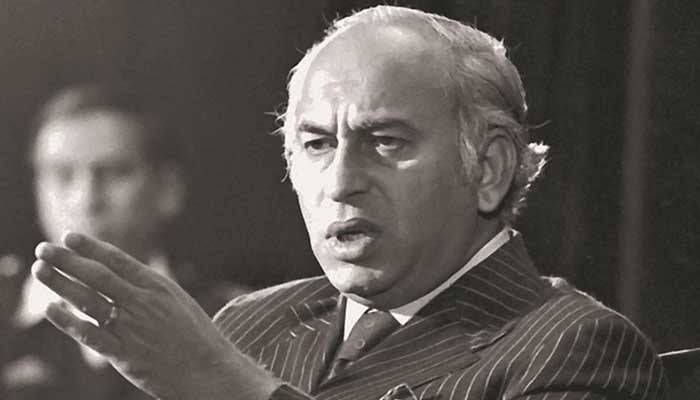
The Supreme Court, in a unanimous verdict issued by a 9-member large bench, declared that former Prime Minister Zulfikar Ali Bhutto did not receive a fair trial, in the presidential reference on the former premier’s hanging.
Background of Zulfikar Ali Bhutto's Case
Zulfikar Ali Bhutto, known for founding the Pakistan Peoples’ Party (PPP), held the Prime Minister's office from 1973 to 1977. Before this, he served as a fervent Foreign Minister, advocating for Pakistan's interests on the global stage. His tenure was marked by a series of ambitious social and economic reforms, including land redistribution and nationalization of key industries such as banking, steel, heavy engineering, and basic chemicals. However, political unrest and allegations of authoritarianism clouded his leadership.
In July 1977, Bhutto was ousted in a military coup led by General Muhammad Zia-ul-Haq, triggering a period of instability. It also marked a pivotal shift in Bhutto's political career and subsequently led to his arrest on controversial charges – notably, accusations of involvement in the murder of his political opponent, Ahmad Raza Kasuri.
After a contentious trial, Bhutto was found guilty and given the death penalty by the Lahore High Court in March 1978. Despite widespread international appeals and allegations of procedural irregularities, Bhutto's appeals were rejected, leading to his execution on April 4, 1979, at Central Jail Rawalpindi.
Reopening of ZAB's Case
The quest for justice for Zulfikar Ali Bhutto continued even after his execution. While his supporters viewed him as a martyr, his detractors considered him a symbol of political corruption and authoritarianism. Despite that, demands for a review of his case arose, with many alleging an unfair trial under General Zia-ul-Haq's military regime.
In 2011, during the tenure of President Asif Zardari, a member of the PPP and Bhutto's son-in-law, a Presidential Reference was filed to reopen Bhutto's case. The reference invoked Article 186 of the Constitution, which empowers the Supreme Court to render opinions on questions of law of public importance referred to it by the President.
It specifically questioned whether the trial and appeal proceedings against Bhutto met the requirements of due process and fair trial as embedded in the Constitution.
Historical Underpinnings of ZAB's Wrongful Hanging
To understand the significance of the SC verdict, it is essential to examine the historical context surrounding Zulfikar Ali Bhutto's trial and execution. Bhutto's rise to power in the early 1970s marked a significant shift in Pakistan's political landscape, as he championed populist reforms and sought to empower the country's marginalized segments.
However, Bhutto's tenure was marred by allegations of authoritarianism and political repression, particularly following the controversial 1977 elections.
The military coup led by General Zia-ul-Haq in 1977 ushered in a new era of authoritarian rule, characterized by political instability and human rights abuses. Bhutto's arrest and subsequent trial under martial law raised concerns about the fairness of the legal process, with many alleging that the military regime sought to eliminate a political rival through judicial means.
The trial proceedings against Bhutto were fraught with irregularities, including allegations of witness tampering, such as by the coerced testimony of witnesses like Masood Mahmood, who later recanted his statements, citing intimidation and coercion. Judicial bias was also evident, notably when Justice Mushtaq Hussain, the presiding judge of the Lahore High Court, was perceived to have displayed bias against Bhutto throughout the trial. Additionally, reports of political interference surfaced, with General Zia-ul-Haq's military regime being accused of manipulating the legal process to secure Bhutto's conviction.
However, despite numerous appeals for Bhutto’s fair trial, he was convicted and sentenced to death, leading to widespread condemnation both at home and internationally, as his supporters decried the trial as politically motivated and a gross miscarriage of justice.
SC Verdict on ZAB's Case
Following years of legal proceedings, the SC finally delivered its opinion on Bhutto’s case. The nine-member bench, led by Chief Justice Qazi Faez Isa, unanimously concluded that Bhutto did not receive a fair trial by the Constitution and the principles of due process.
The proceedings of the trial by the Lahore High Court and the appeal by the SC did not meet the requirements of the Fundamental Right to a fair trial and due process, as enshrined in Articles 4 and 9 of the Constitution. These rights were later guaranteed as separate and independent Fundamental Rights under Article 10A of the Constitution.
The SC's opinion highlighted significant deficiencies in both the trial conducted by the Lahore High Court and the subsequent appeal before the Supreme Court of Pakistan.
Additionally, the court reflected on the judiciary's duty, stating:
"There have been some cases in our judicial history that created a public perception that either fear or favor deterred the performance of our duty to administer justice by the law. We cannot correct ourselves and progress in the right direction until we acknowledge our past mistakes.”
The announcement of the SC's verdict stirred strong emotions, especially among PPP members and the Bhutto family. PPP Chairman Bilawal Bhutto Zardari, visibly moved by the decision, described it as a "historic moment" and extended his thanks to the judges, legal experts, and supporters who relentlessly sought justice for his grandfather.
The verdict also resonated with leaders from different parties weighing in on its significance. Prime Minister Shehbaz Sharif welcomed the decision as a “positive development” and emphasized the necessity of acknowledging past missteps to forge a fairer society.

